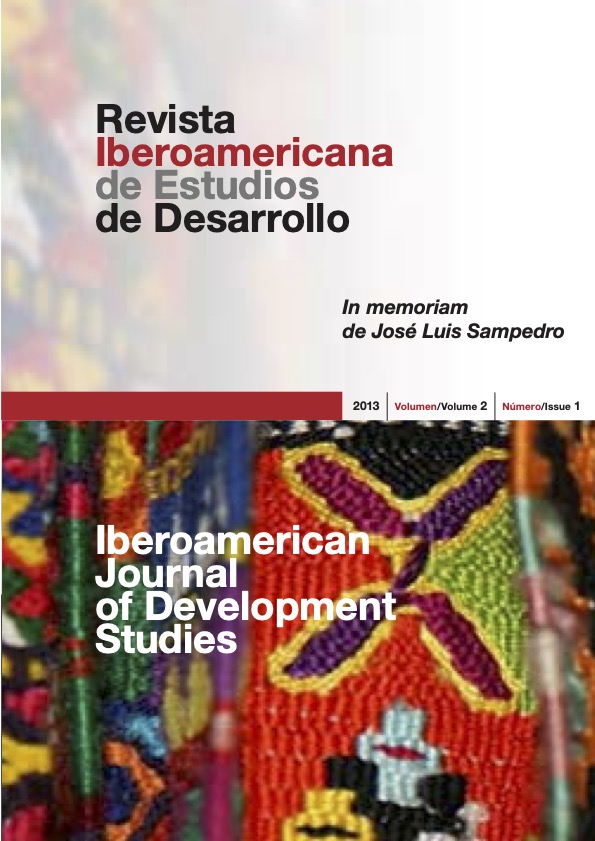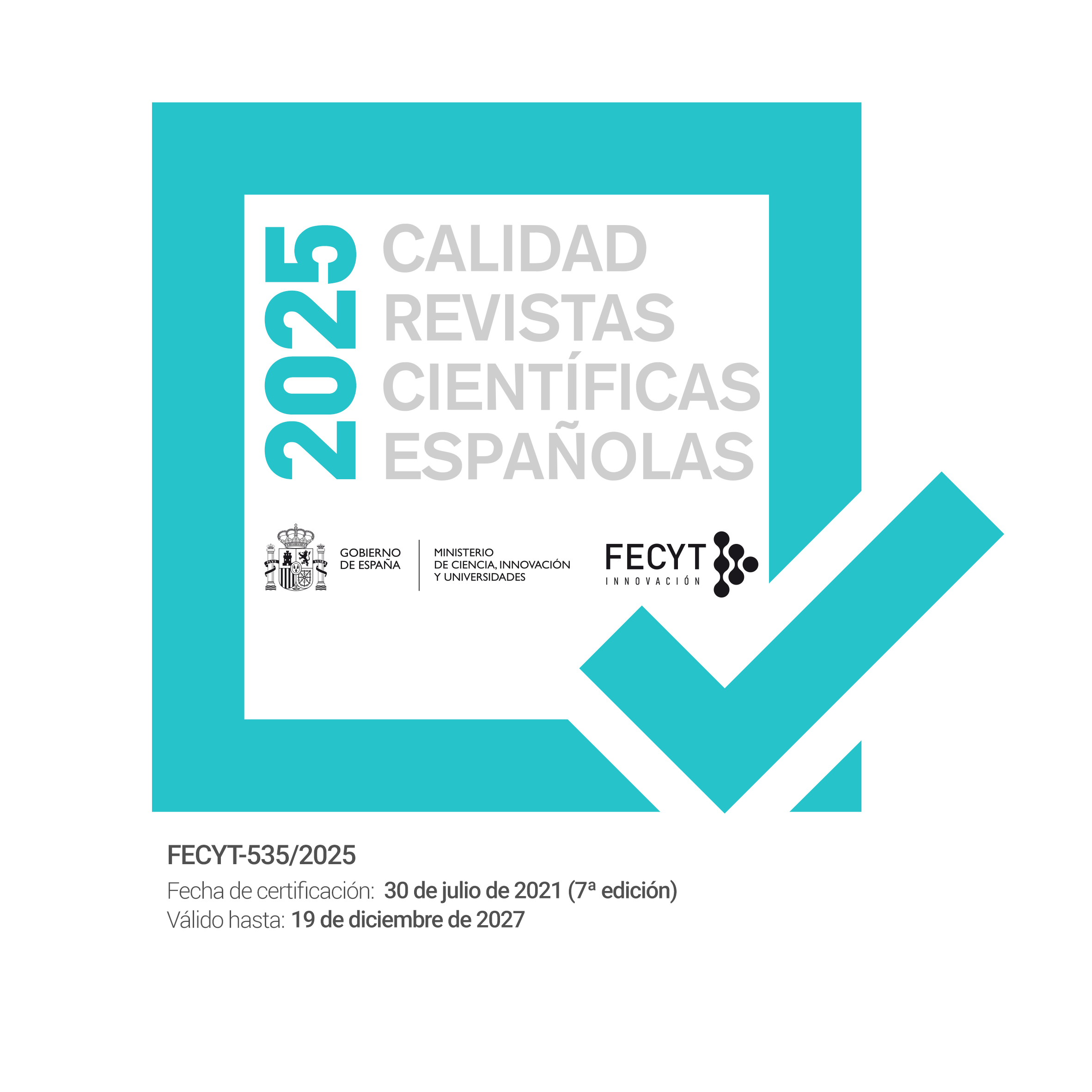A very thin line separates the donor's role as an active agent in the development process from his complementary role. Particularly in the case of budget support, donors seem to be progressively retreating from their monitoring tasks by appealing to the a
DOI:
https://doi.org/10.26754/ojs_ried/ijds.51Keywords:
budget support, accountability and responsibility, monitoring, donor institutionsAbstract
A very thin line separates the donor's role as an active agent in the development process from his complementary role. Particularly in the case of budget support, donors seem to be progressively retreating from their monitoring tasks by appealing to the appropriation principle stated in the Paris Declaration. This article reviews some of the most frequent elements of this lack of monitoring of budget support, both at political and technical level.
CITE AS:
Wood-Valdivielso, M., Colombo, E. (2013). Hacia la Responsabilidad de los Donantes en el Seguimiento del Apoyo Presupuestario: Consideraciones Políticas y Técnicas. Iberoamerican Journal of Development Studies, 2 (1): 46-70
Downloads
References
ALONSO JA (2004). El desarrollo como proceso abierto al aprendizaje. The European Journal of Development Research 16(4):845-867
ÁLVAREZ R (2010). El apoyo presupuestario en la cooperación al desarrollo europeo: Una falsa panacea. FRIDE 30
BANCO MUNDIAL (2001). The Role of Government in Strengthening Country Ownership of the Development Agenda. Institute for Economic Affairs (Ghana) and CDF Secre¬tariat
BANCO MUNDIAL (2002). Review of the Poverty Reduction Strategy Paper Approach: Early Experience with Interim PRSPs. The World Bank
BANCO MUNDIAL (2007). Results-Based National Development Strategies, Assessment and Challenges Ahead. The World Bank
BANCO MUNDIAL (2011). The World Wide Governance Indicators Project. http://info.worldbank.org/governance/wgi/index.asp, accesed 12 April 2012
BANCO MUNDIAL, FMI (2003). Progresos en la aplicación de los documentos de estra¬tegia de lucha contra la pobreza. The World Bank
BANCO MUNDIAL, FMI (2005). Review of the PRS Approach: Balancing Accountabilities and Scaling Up Results. The World Bank
BIERSCHENK T, THIOLERON E, BAKO-ARIFARI N (2002). Institutionnaliser la stratégie de réduction de la pauvreté au Bénin. Institut für Ethnologie und Afrikastudien, Jo¬hannes Gutenberg-Universität.
BIERSCHENK T, THIOLERON E, BAKO-ARIFARI N (2003). Benin. Development Policy Review 21(2):161-178
BOOTH D (2003a). Fighting Poverty in Africa. Are PRSPs Making a Difference? (ed.). Overseas Development Institute.
BOOTH D (2003b). Introduction and Overview. Development Policy Review 21(2):131-159
BOOTH D (2005). Missing Links in the Politics of Development: Learning from the PRSP Experiment. Overseas Development Institute Working Paper 256
BOOTH D (2011). Aid effectiveness: bringing country ownership (and politics) back in. Overseas Development Institute Working Paper 336
CAPUTO E, LAWSON A, VAN DER LINDE M (2009). Methodology for evaluations of bud¬get support operations at country level. Assignment for the European Commission
CHERU F (2006). Building and supporting PRSPs in Africa: what has worked well so far? What needs changing? Third World Quarterly 27(2):355-376
COMISIÓN EUROPEA (2011). The future approach to EU budget support to third coun¬tries. Comunicación de la Comisión Europea al parlamento europeo, el comité eco¬nómico y social y el comité de las regiones 18-19,54
CORDELLA T, DELL’ARICCIA G (2007). Budget support vs. project aid: a theoretical ap¬praisal. The Economic Journal 117:1260-1279
DRISCOLL R, EVANS A (2005). Second-Generation Poverty Reduction Strategies: New Opportunities and Emerging Issues. Development Policy Review 23(1):5-25
FONDO MONETARIO INTERNACIONAL (2012a). Documentos de Estrategia de Lucha contra la Pobreza (DELP). http://www.imf.org/external/np/exr/facts/prsp.htm
FONDO MONETARIO INTERNACIONAL (2012b). El FMI: Datos básicos. http://www.imf.org/external/np/exr/facts/spa/glances.htm
FOSTER M, LEAVY J (2001). The Choice of Financial Aid Instruments. Overseas Develo¬pment Institute Working Paper No 158.
HOPKINS R, POWELL A, ROY A, GILBERT C (2006). The World Bank, conditionality and the Comprehensive Development Framework. In: Gilbert y Vines (eds.). The World Bank: Structures and policies. The World Bank, 282-298
JELOVAC I Y VANDENINDEN F (2008). How should donors give foreing aid? Project aid versus budget support. University of Liège Working Paper No 04
JONES GW (1992). The search for local accountability. In: S. Leach (ed.), Strengthening local government in the 1990s. Longman, London 49-78
JONES S, LAWSON A (2000). Moving from Projects to Programmatic Aid. The World Bank Operations Evaluation Department Working Paper Series No 5
KOEBERLE S, STRAVESKI Z (2006). Budget Support. Concept and issues. In: Koeberle S, Straveski Z, Walliser J (eds.), Budget Support as a more effective aid? Recent experiences and emerging lessons. The World Bank 3-23
KNACK S, EUBANK N (2009). Aid and Trust in Country Systems. The World Bank Policy Research Working Paper No 5005
MICHEL L (2008). Budget Support: A question of mutual trust. European Commission
MOSLEY P y ABRAR S (2005). Budget support, conditionality and poverty. Sheffield Eco¬nomic Research Paper Series No 200 5012
MULGAN R (2000). Accountability: an ever expandig concept? Public Administration 78(3):555-573
OCDE (2003). Harmonising Donor Practices for Effective Aid Delivery. DAC Guidelines and references series 1
OCDE (2005). Évaluation Conjointe d’Appui Budgétaire Général 1994-2004. OCDE
OCDE (2006). Harmonising Donor Practices for Effective Aid Delivery. Budget Support, sector wide approaches and capacity development 2
OCDE (2012). OCDE Stats http://stats.oecd.org/index.aspx?queryid=33364# , Accessed 12 April 2012
SCHILTZ JL, BICHLER M (2008). Qui a peur d l’appui budgétaire? Centre Européen de gestion des politiques de développement, Paper No 88
SPA SURVEY (2012). Budget Support Alignment Survey. www.spasurvey.info, Accessed 12 April 2012
STIGLITZ J (2003). Democratizing the International Monetary Fund and the World Bank: Governance and accountability. Governance 16(1):111-139
SWISS CONFERDERATION (2004). Donor Harmonisation in Practice. Swiss Experiences in Chairing Multi-Donor Budget Support Groups. Federal Department of Economic Affaires
TRIBUNAL DE CUENTAS EUROPEO (2010). The Commission’s management of general budget support in ACP, Latin American and Asian countries. Special report No 11
VIELAJUS M (2009). Le défi de la «redevabilité» des agences de développement dans leurs propres pays et face à leurs pairs. Institute de recherche et débat sur la gou¬vernance. Agence Français du développement
WHITFIELD L (2010). The state elite, PRSP and Policy Implementation in Aid-dependent Ghana. Third World Quarterly 31(5):721-737
WILLIAMSON T, DOM C (2010). Sector Budget Support in Practice. Good Practice Note. Overseas Development Institute.
WOLL B (2008). Donor harmonisation and government ownership: multi-donor budget support in Ghana. The European Journal of Development Research 20(1):74-87
Downloads
Published
Issue
Section
License
Copyright (c) 2013 Marta Wood-Valdivielso, Enrico Colombo

This work is licensed under a Creative Commons Attribution-NonCommercial-NoDerivatives 4.0 International License.





